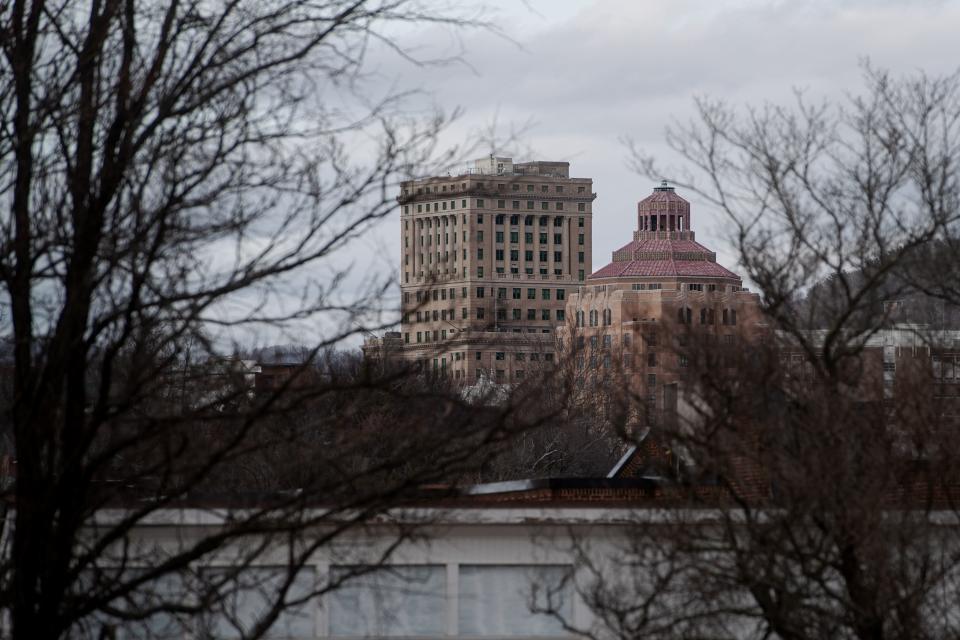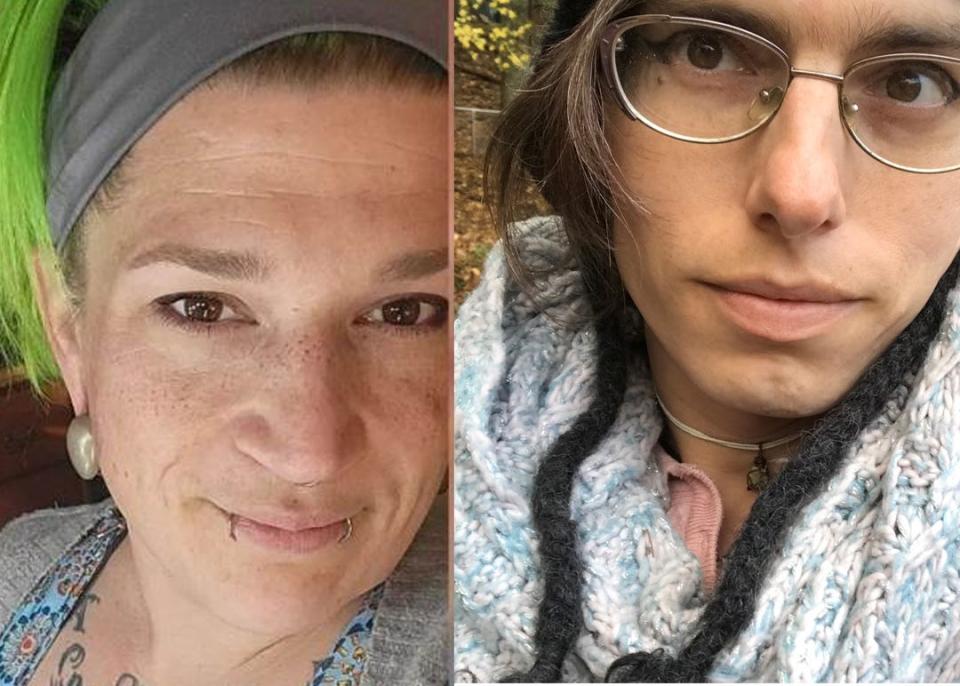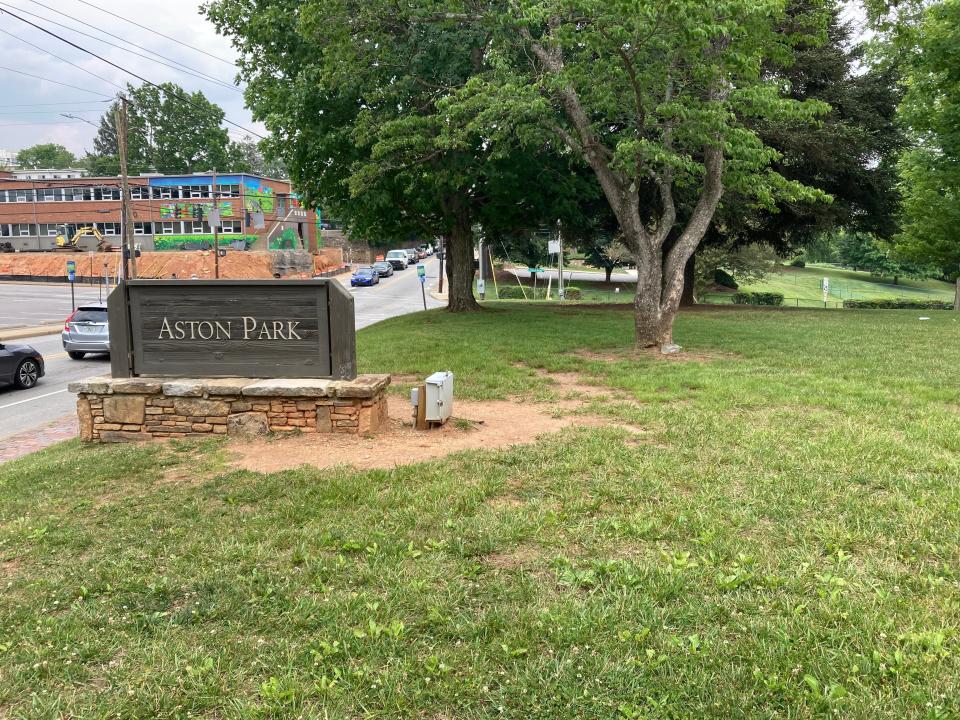Asheville reporters file brief with NC Court of Appeals in Aston Park trespassing case
ASHEVILLE - Two local journalists are appealing a June verdict that found them guilty of misdemeanor second-degree trespass while covering a protest in a downtown park, according to an appellant brief filed March 22.
Matilda Bliss and Veronica Coit, both reporters with the Asheville Blade, a leftist local news co-op, were arrested Christmas night 2021 as Asheville police cleared Aston Park of sanctuary camping demonstrations. Reporters Bliss and Coit recorded officers as they dismantled tents and asked protesters to vacate the park after its 10 p.m. closing.
Four others were also arrested that night and 16 people were later indicted on charges of felony littering in connection to the Christmas week protests. Charges for some, including several mutual aid workers, are still pending.
Bliss and Coit were found guilty by a Superior Court jury after a weeklong trial in June. They were also found guilty of the same trespassing charges in April 2023 after a bench trial in Buncombe County District Court. They are now appealing their case to the N.C. Court of Appeals, the second highest court in the state.

What does the brief say?
The appellant brief argues that Bliss' and Coit's convictions violated the First Amendment, which protects speech and freedom of the press, and that the trial court's jury instructions, delivered mid-deliberation, "misled the jury and prejudiced the verdicts," warranting a new trial.
It is a "rare occasion" that a case like this has gone to trial, said Trevor Timm, executive director of the Freedom of the Press Foundation, a New York-based nonprofit. Over the last decade, at least 21 reporters have been arrested for trespassing, according to the U.S. Press Freedom Tracker, cited in the brief.
Of those incidents, only five proceeded to trial. Bliss and Coit are two of them.
“The fact that this has gotten this far is incredibly worrying. Not just for these two journalists, but for all journalists in North Carolina," Timm told the Citizen Times March 24.
Despite garnering international attention from organizations that advocate for press freedom issues, and Twitter posts from actor John Cusack, a board member of Freedom of the Press Foundation, the First Amendment could not be used as a defense in the Superior Court case.
Buncombe County Superior Court Judge Tommy Davis told attorneys during the summer trial that the jury would be limited to considering whether the reporters violated a city park ordinance. Whether the reporters' constitutional rights were violated would be decided by the court. Later in June, Davis ruled that the city ordinance and trespassing statute was not unconstitutionally applied.
The appellant brief filed in March puts First Amendment protection at the center of its case, arguing that such convictions are a “dangerous step toward the evisceration of freedom of the press in North Carolina,” and that the defendants' right to access the protest clearing was protected.
Bodycam footage shows Bliss and Coit repeatedly identifying themselves as press.

“Our position is that the First Amendment guaranteed these reporters the right to cover that police action,” said Ben Scales, among the defendants' counsel. “Arresting them violated their rights.”
The brief's second argument states that even if the court concludes First Amendment protections do not apply, the trial court's response to a jury note was "prejudicial error."
The "note" references a request for clarifications submitted by the jury during deliberation. They asked if there was further instruction on the applicability of the First Amendment — this is after the court's ruling that the "applicability of First Amendment defense was a legal question outside the jury's scope," said the brief — and to ask if the defendants' status as press was a potential exemption from the city's ordinance.
The brief argues that the court's answer to the jury note likely misled the jury to believe it could not consider First Amendment values or the defendants' position as journalists in reaching its verdict. It also argues that the court gave instructions to the jury that "substantially deviated" from what it had told defense counsel it intended to say, "thus depriving counsel of the opportunity to object with specificity."
A 'puzzling' case, law professor says
The brief was authored, in part, by Sarah Ludington, director of Duke Law's First Amendment Clinic, along with Amanda Martin, a supervising attorney with the clinic, and two law students, Cat Reid and Riley Blake.
"There isn't a lot of higher court decisions in North Carolina state courts about the significance of press freedoms and press rights, so we thought this could be a good potential vehicle for creating good precedent," Ludington told the Citizen Times March 25.
That the case has gotten a far as it has, she said, has left them "frankly scratching our heads." The journalists were standing to the side on the night of their arrests, one with a press pass, clearly identifying themselves, "which makes it especially puzzling why these journalists were prosecuted."

"This was a unique case because convictions of journalists are extremely rare in the United States," Reid said. In 2020, there were arrests of journalists being swept up during protests, but most charges were dropped almost immediately.
Reid argued the role of press as "surrogates for the public," was made even more important as few members of the public would have been able to witness those Christmas week protests and and the subsequent clearing.
"There was an argument at the trial level that this had nothing to do with the First Amendment, and that this was not a First Amendment case, and clearly we most certainly think that it is and that newsgathering has protection as a predicate to First Amendment speech," Reid said.
With the appellant brief filed, the state must file its own appeal within 30 days. After the state files, Scales said they will have the option to file a reply. The N.C. Court of Appeals can decide if they want to hear an oral argument or deliberate based solely on the legal briefs. A final decision or opinion can take months.
More: Asheville Blade reporters found guilty of trespassing: Superior Court verdict
More: Asheville reporters trial: jurors queried on trans people, police, media
Sarah Honosky is the city government reporter for the Asheville Citizen Times, part of the USA TODAY Network. News Tips? Email shonosky@citizentimes.com or message on Twitter at @slhonosky. Please support local, daily journalism with a subscription to the Citizen Times.
This article originally appeared on Asheville Citizen Times: Asheville reporters file appeal in Aston Park trespassing case

